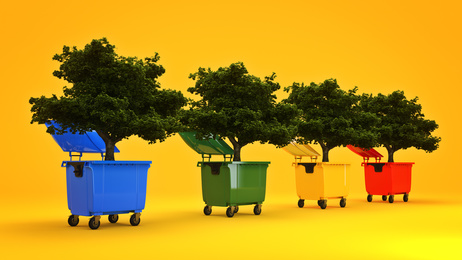At Christmas, more than at any other time of the year, the sheer volume of plastic, glass, metal and general packaging entering the average household is astonishing. By the time New Year’s Eve rolls around, the wheelie bin is overflowing but you tell yourself it’s OK because, afterall, it’s all going to be recycled – but is it?
 The truth behind the recycling myth
The truth behind the recycling myth
The disappointing news is that around only 50% of everything you put out in the recycling collection actually ends up being recycled. The reasons for it being rejected are many but commonly include contamination with food material, and objects being too small for the baling system (recycling is baled before being shipped offshore for rendering down). But that doesn’t mean it’s not possible to achieve your 100% recycling goal – you just need to understand a few basic facts before you begin.
Plastics
Plastic recycling in New Zealand divides broadly into two compartments: polyethylene (milk bottle plastic) and ‘other’ plastics. While the usual recycling advice of leaving lids on their containers is helpful, it doesn’t answer the question of what to do with small items of plastic that don’t belong to a larger recyclable container (such as the plastic screw tops from Tetra Pacs). To solve the problem problem, all you have to do is place these small items inside a recyclable bottle belonging to the same plastic group, and screw the lid back on it. Easy!
Where it can get tricky, however, is when plastic is considered ‘contaminated’ by a very small amount of paper left on it. This can happen with the plastic peeled from a blister pack of, for example, batteries. Why this sort of plastic would be considered contaminated while a plastic tomato sauce bottle with a paper label on it wouldn’t be, is anyone’s guess. And no one in positions of authority can come up with an answer!
Soft plastics
The best news for ardent recyclers has only recently arrived in New Zealand, and it’s the announcement that soft plastics can now be accepted for recycling. Soft plastics include the dreaded supermarket bags and the kind of plastic shrink wrap that protects your morning newspaper from rain. This kind of plastic can now be deposited at major supermarkets where it is collected and melted down for use in plastic planks of the sort that are used to make park benches.
Glass
Metal lids and collars left on glass bottles and jars will not be recycled. They will be ‘consumed’ by the heat of the glass-melting process. If you wish to have them recycled, remove them from the glass and seal them inside a larger container made of the same metal (aluminium wine bottle collars could be placed inside an aluminium can, for instance).
Metal, paper and card
These are the least-fussy of the recycling groups. Make sure everything is clean and it’ll almost certainly be recycled. The possible exception is pizza boxes which are notorious for containing leftovers. But if you open them out and pack them flat, they’ll very likely be accepted, too.
Congratulations!
If you’ve made it to here with your reading, you’re probably the sort of person who is already doing what we should all be trying to do: reduce, reuse and therefore not have to recycle at all. And if you’re doing that – congratulations!








Join the Discussion
Type out your comment here:
You must be logged in to post a comment.